Module 9 Unit 1 Are you going to run on sports day 复习课件(共45张PPT)
文档属性
| 名称 | Module 9 Unit 1 Are you going to run on sports day 复习课件(共45张PPT) | 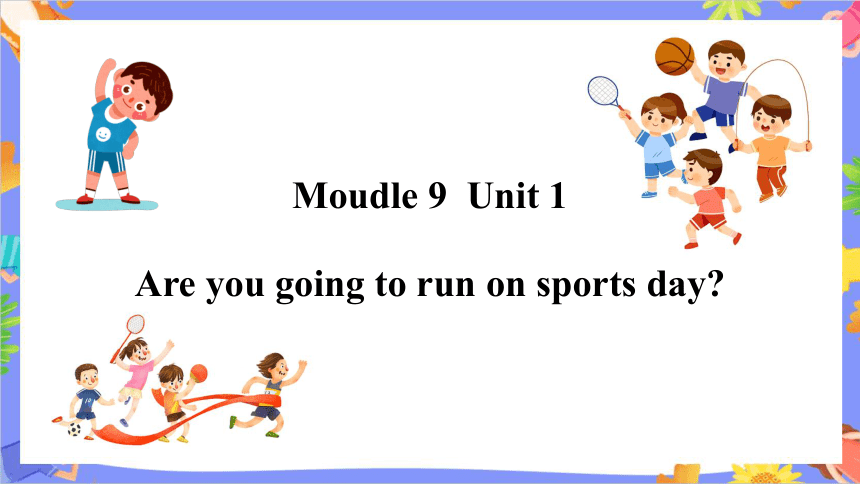 | |
| 格式 | pptx | ||
| 文件大小 | 9.0MB | ||
| 资源类型 | 试卷 | ||
| 版本资源 | 外研版(三年级起点) | ||
| 科目 | 英语 | ||
| 更新时间 | 2023-12-21 08:47:26 | ||
图片预览


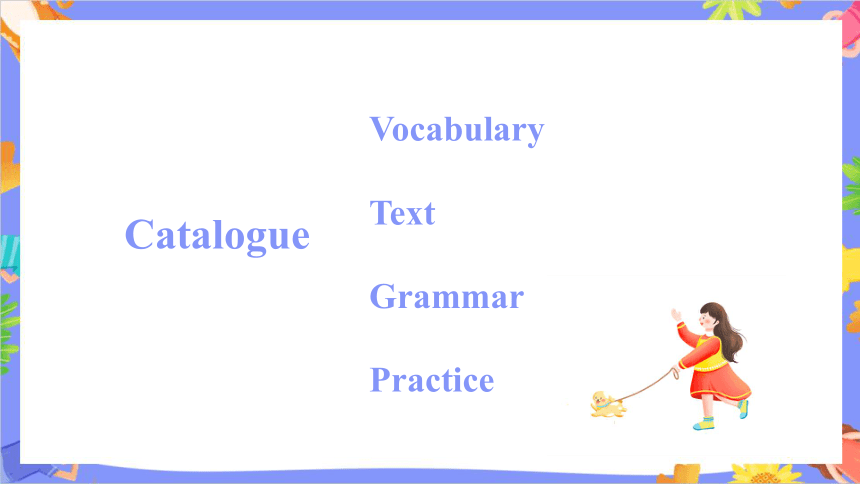
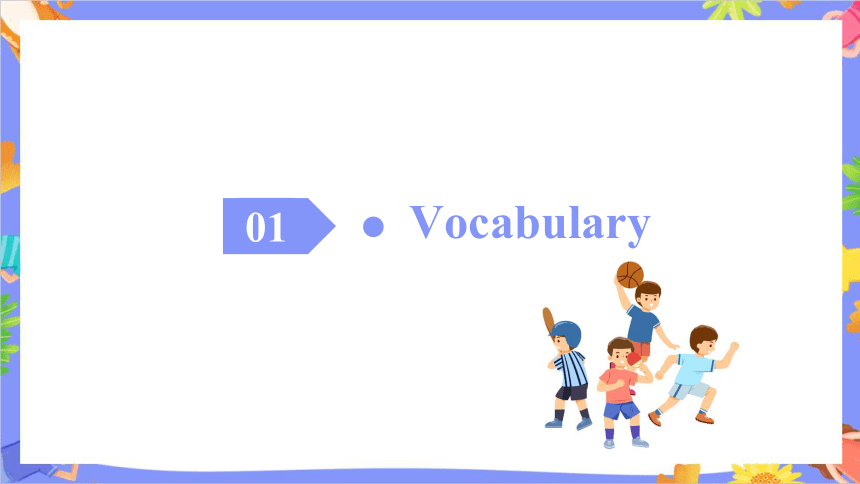

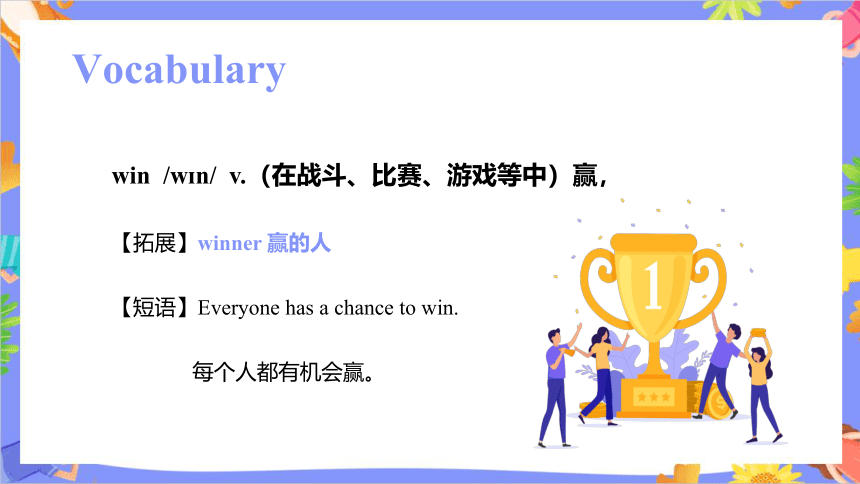
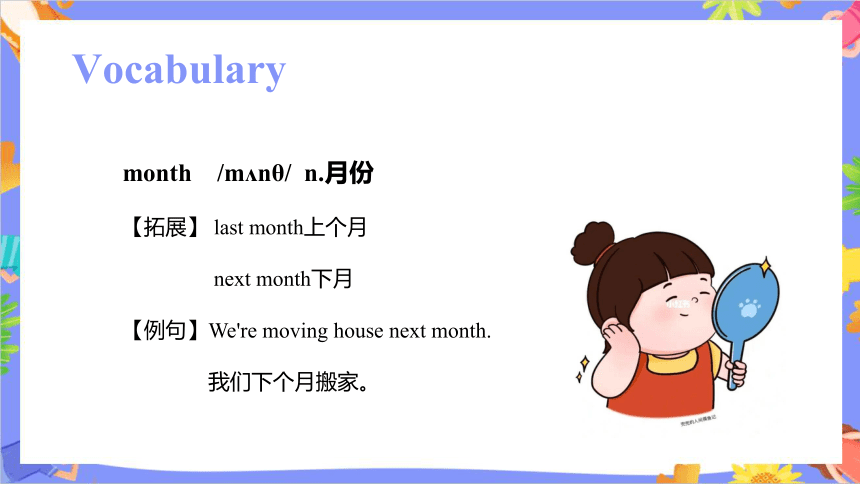
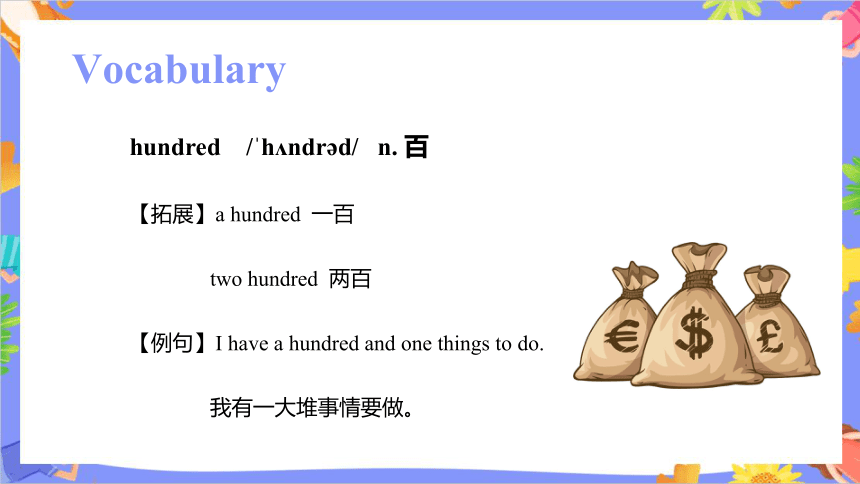
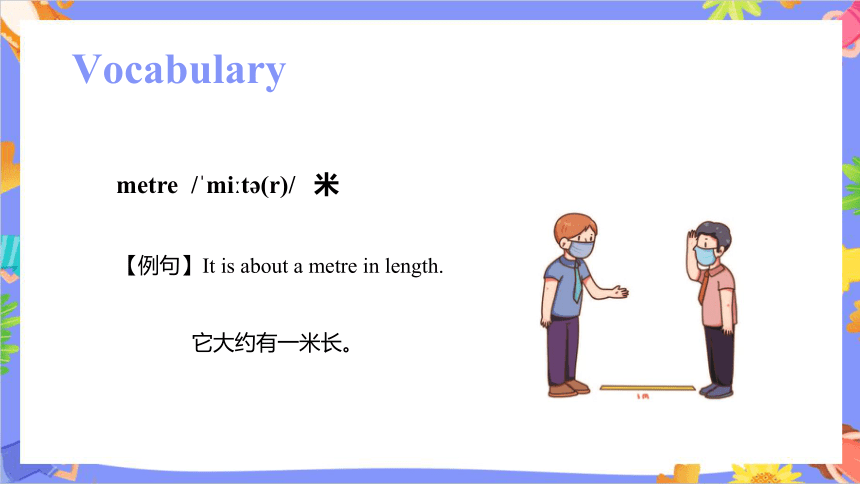
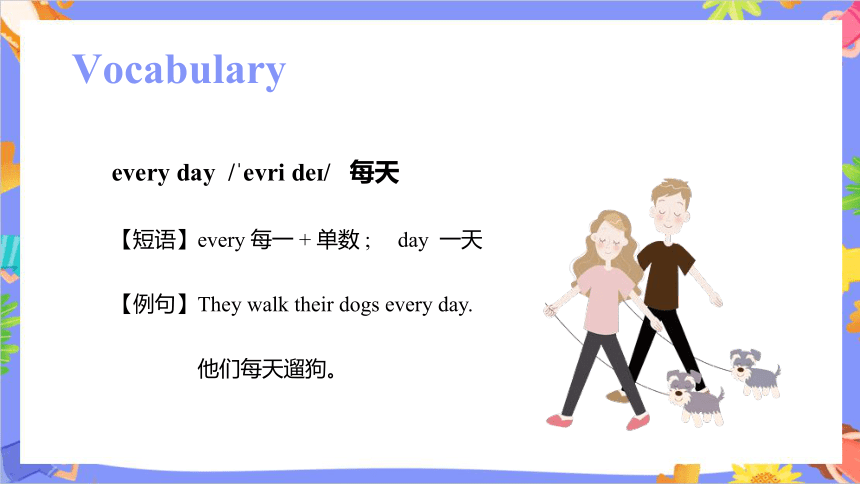
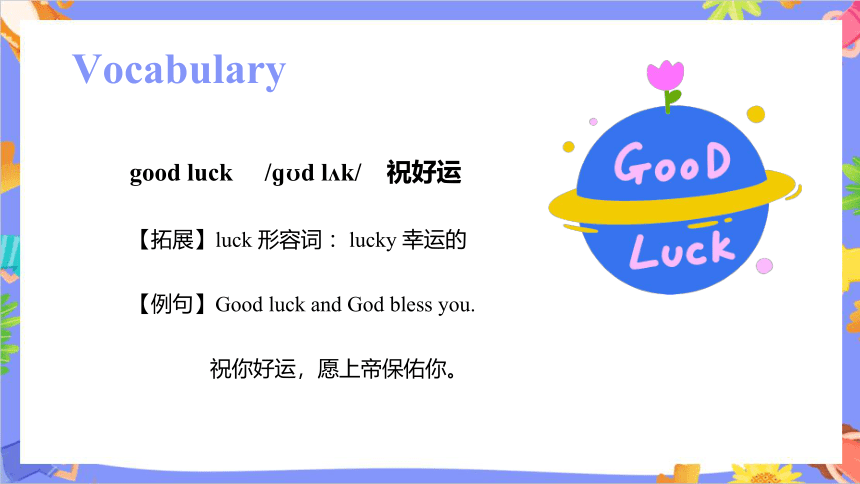

文档简介
(共45张PPT)
Moudle 9 Unit 1
Are you going to run on sports day
学习目标
1. 学习词汇:for, metre,every day, good luck, come on.
2. 掌握句型: Are you going to rely on sports day
Yes. I m going to run the one hundred meters.
3. 掌握语法:一般将来时的疑问句句型来描述将来发生的事情
4. 会运用 good luck、come on!等词对别人表示祝福。
Catalogue
Vocabulary
Text
Grammar
Practice
01
Vocabulary
Vocabulary
sports day / sp ts de / 运动日
【例句】We are going to have a Sports Day.
我们将要举行一个运动会。
win /w n/ v.(在战斗、比赛、游戏等中)赢,【拓展】winner 赢的人
【短语】Everyone has a chance to win.
每个人都有机会赢。
Vocabulary
month /m nθ/ n.月份
【拓展】 last month上个月
next month下月
【例句】We're moving house next month.
我们下个月搬家。
Vocabulary
hundred / h ndr d/ n. 百
【拓展】a hundred 一百
two hundred 两百
【例句】I have a hundred and one things to do.
我有一大堆事情要做。
Vocabulary
metre / mi t (r)/ 米
【例句】It is about a metre in length.
它大约有一米长。
Vocabulary
every day / evri de / 每天
【短语】every 每一 + 单数 ; day 一天
【例句】They walk their dogs every day.
他们每天遛狗。
Vocabulary
good luck /ɡ d l k/ 祝好运
【拓展】luck 形容词 :lucky 幸运的
【例句】Good luck and God bless you.
祝你好运,愿上帝保佑你。
Vocabulary
come on / k m n/ 加油
【例句】Come on, it's time to go home.
快点,该回家了。
Vocabulary
重点词组:
月 month
每个 every
一天 day
祝你好运 Good luck.
加油 Come on.
运动日 sports day
02
Text
Listen and chant.
你要跑吗
你要去游泳吗
你要跳吗
你会赢吗
-Are you going to...
你们将要......
这个月我们将有一个运动会。
1.this month 这个月
2.sports day 这里指运动会
Listen, point and find "Are you going to... ".
Listen, point and find "Are you going to... "
你打算在运动日跑步吗
是的,我要跑100米。
我要每天跑步。
1.run 跑步
Listen, point and find "Are you going to... ".
不,我要去公园跑步。
你现在要去上学吗
再见, 大明! 好运!
谢谢!再见。
Are you going to schoolnow
你要去学校吗?
go, come 等表示位移的动词
用现在进行时表将来。
Listen, point and find "Are you going to... "
加油,大明。快跑! 快跑!
是的!
我是赢家!
我是赢家!
拓展:1.I'm the winner.
我是胜利者。
Listen and say.
你打算在运动日跑步吗
是的,我要跑100米。
你要去上学吗
不,我要去公园跑步。
一般疑问句: Are you going to+动词原形+其他?
e.g. Are you going to run on sports day
肯定回答: Yes, I am.
否定回答: No, I'm not.
一般将来时的一般疑问句
1.Are you going to play football on sports day
2.Are you going to play pingpong on sports day
3.Are you going to run on sports day
4.Are you going to play basketball on sports day
5.Are you going to swim on sports day
句型
03
Grammar
Grammar
一般将来时的一般疑问句句型
一般疑问句: Be+主语+going to+动词原形+其他
e.g. Are you going to have a picnic this afternoon
肯定回答: Yes, I am.
否定回答: No, I'm not.
1.当句子中有be动词时,把be动词提到句子的前面变为疑问句,
如be动词是am,要将am改为are,将I改为you;
陈述句: I am going to dance this evening.
疑问句: Are you going to dance this evening
Grammar
【重点知识点】
1. We are going to have a sports day this month. ________________________________
【讲解】are going to......是表示将来时的助动词,译为:将......
are going to后边加动词原形。
固定搭配:举办一个运动日_____________________
Grammar
have a sports day
Grammar
2.--Are you going to run on sports day
--Yes, I’m going to run the 100 metres.
【讲解】固定搭配:跑100米:_____________________
run the 100 metres
Grammar
3. --Are you going to school now
--No, I’m going to run in the park.
【讲解】固定搭配:在公园里: _____________________
in the park
04
Practice
翻译短语。
1. 运动日_______ 2. 每天 _______
3. 加油 __________ 4. 一百 __________
5. 祝你好运________
【答案】1. sports day 2. every day 3. come on 4. one hundred 5. good luck
用所给词的适当形式填空。
1. Are you going to run on _____(sport) day
2. I ____ (be) going to jump.
3. I am the_____ (win) in this game.
4. I’m going to run the 100 ______ (metre).
5. Good _____ (lucky) to you.
【答案】1. sports 2. am 3. winner 4. metres 5. luck
选择填空。
( ) 1. ______ you going to the zoo tomorrow.
A. Are B. Am C. Is
( ) 2. I____ now, and I ____ tomorrow.
A. am running; jump B. am running; am going to jump
C. am going to run; am going to jump
参考答案:1.A 2.B
( ) 3. We are going to the zoo ____ this month.
A. / B. on C. in
( ) 4. They are visiting the park ______.
A. now B. next Sunday C. last night
( ) 5. My sister _____ every day.
A. play sports B. plays sports C. is going to play sports
参考答案:3.A 4.A 5.B
按要求完成下列各题。
1. run/ going/ I’m/ to/ sports/ on/ day (.) (连词成句)
___________________________________________
2. the/ she/ winner/ is (.)(连词成句)
___________________________________________
3. in/ we/ are/ to/ run/ the/ going/ afternoon (.)(连词成句)
_________________________________________
4. She is going to jump in the school.(改为否定句)
_____________________________________________
5. We are going to run in the park tomorrow. (变一般疑问句并做否定回答)
--_________________________________
--___________.
【答案】
1. I’m going to run on sports day.
2. She is the winner.
3. We are going to run in the afternoon.
4. She is not going to jump in the school.
解析:be后加not构成否定句。
5. Are you going to run in the park tomorrow
No, we aren’t.
解析:be动词提到句首变为一般疑问句,第一人称改为第二人称。
选词填空。
run jump What on luck
Linda:Next Monday is our sports day. 1. _____ sports are you going to do
Jim: I am going to 2.____ . I run very fast.
Linda: Great! I am going to 3. _____. I jump high.
Jim:We are going to do well 4.______ sports day.
Linda: Good 5._____! Come on!
【答案】1. What 2. run 3. jump 4. on 5. luck
根据所给汉语意思写单词补全句子。
1. We’re going to visit Beijing _________(明天).
2. We are going to _______(参观) the zoo.
3. He’s going to _________(赢).
4. I’m going to run the 100 ________(米).
tomorrow
win
metres
visit
照例子,仿写句子。
例:I (read a book) this evening
I’m going to read a book this evening.
1. we (run) next week
______________________
We are going to run next week.
照例子,仿写句子。
例:I (read a book) this evening
I’m going to read a book this evening.
2. Tom (swim) tomorrow
______________________
Tom is going to swim tomorrow.
照例子,仿写句子。
例:I (read a book) this evening
I’m going to read a book this evening.
3. I (fly a kite) this afternoon
______________________
I am going to fly a kite this afternoon.
阅读短文,判断正(T)误(F)。
My name is Tim. Tomorrow is the weekend(周末). We have no classes. My parents aren’t going to work, but we are going to be very busy tomorrow. My father is going to visit my aunt and uncle.
I’m going to play computer games with my cousin. Tomorrow evening we are going to have a big dinner. After that we are going to go to the cinema. I think we are going to have a nice weekend.
( )1. Tomorrow is the weekend.
( )2. Tim’s father is going to buy something.
( )3. Tim’s father is going to visit his grandparents.
( )4. Tim is going to play computer games with his friends.
( )5. They are going to go to the cinema tomorrow evening.
Thank you!
Moudle 9 Unit 1
Are you going to run on sports day
学习目标
1. 学习词汇:for, metre,every day, good luck, come on.
2. 掌握句型: Are you going to rely on sports day
Yes. I m going to run the one hundred meters.
3. 掌握语法:一般将来时的疑问句句型来描述将来发生的事情
4. 会运用 good luck、come on!等词对别人表示祝福。
Catalogue
Vocabulary
Text
Grammar
Practice
01
Vocabulary
Vocabulary
sports day / sp ts de / 运动日
【例句】We are going to have a Sports Day.
我们将要举行一个运动会。
win /w n/ v.(在战斗、比赛、游戏等中)赢,【拓展】winner 赢的人
【短语】Everyone has a chance to win.
每个人都有机会赢。
Vocabulary
month /m nθ/ n.月份
【拓展】 last month上个月
next month下月
【例句】We're moving house next month.
我们下个月搬家。
Vocabulary
hundred / h ndr d/ n. 百
【拓展】a hundred 一百
two hundred 两百
【例句】I have a hundred and one things to do.
我有一大堆事情要做。
Vocabulary
metre / mi t (r)/ 米
【例句】It is about a metre in length.
它大约有一米长。
Vocabulary
every day / evri de / 每天
【短语】every 每一 + 单数 ; day 一天
【例句】They walk their dogs every day.
他们每天遛狗。
Vocabulary
good luck /ɡ d l k/ 祝好运
【拓展】luck 形容词 :lucky 幸运的
【例句】Good luck and God bless you.
祝你好运,愿上帝保佑你。
Vocabulary
come on / k m n/ 加油
【例句】Come on, it's time to go home.
快点,该回家了。
Vocabulary
重点词组:
月 month
每个 every
一天 day
祝你好运 Good luck.
加油 Come on.
运动日 sports day
02
Text
Listen and chant.
你要跑吗
你要去游泳吗
你要跳吗
你会赢吗
-Are you going to...
你们将要......
这个月我们将有一个运动会。
1.this month 这个月
2.sports day 这里指运动会
Listen, point and find "Are you going to... ".
Listen, point and find "Are you going to... "
你打算在运动日跑步吗
是的,我要跑100米。
我要每天跑步。
1.run 跑步
Listen, point and find "Are you going to... ".
不,我要去公园跑步。
你现在要去上学吗
再见, 大明! 好运!
谢谢!再见。
Are you going to schoolnow
你要去学校吗?
go, come 等表示位移的动词
用现在进行时表将来。
Listen, point and find "Are you going to... "
加油,大明。快跑! 快跑!
是的!
我是赢家!
我是赢家!
拓展:1.I'm the winner.
我是胜利者。
Listen and say.
你打算在运动日跑步吗
是的,我要跑100米。
你要去上学吗
不,我要去公园跑步。
一般疑问句: Are you going to+动词原形+其他?
e.g. Are you going to run on sports day
肯定回答: Yes, I am.
否定回答: No, I'm not.
一般将来时的一般疑问句
1.Are you going to play football on sports day
2.Are you going to play pingpong on sports day
3.Are you going to run on sports day
4.Are you going to play basketball on sports day
5.Are you going to swim on sports day
句型
03
Grammar
Grammar
一般将来时的一般疑问句句型
一般疑问句: Be+主语+going to+动词原形+其他
e.g. Are you going to have a picnic this afternoon
肯定回答: Yes, I am.
否定回答: No, I'm not.
1.当句子中有be动词时,把be动词提到句子的前面变为疑问句,
如be动词是am,要将am改为are,将I改为you;
陈述句: I am going to dance this evening.
疑问句: Are you going to dance this evening
Grammar
【重点知识点】
1. We are going to have a sports day this month. ________________________________
【讲解】are going to......是表示将来时的助动词,译为:将......
are going to后边加动词原形。
固定搭配:举办一个运动日_____________________
Grammar
have a sports day
Grammar
2.--Are you going to run on sports day
--Yes, I’m going to run the 100 metres.
【讲解】固定搭配:跑100米:_____________________
run the 100 metres
Grammar
3. --Are you going to school now
--No, I’m going to run in the park.
【讲解】固定搭配:在公园里: _____________________
in the park
04
Practice
翻译短语。
1. 运动日_______ 2. 每天 _______
3. 加油 __________ 4. 一百 __________
5. 祝你好运________
【答案】1. sports day 2. every day 3. come on 4. one hundred 5. good luck
用所给词的适当形式填空。
1. Are you going to run on _____(sport) day
2. I ____ (be) going to jump.
3. I am the_____ (win) in this game.
4. I’m going to run the 100 ______ (metre).
5. Good _____ (lucky) to you.
【答案】1. sports 2. am 3. winner 4. metres 5. luck
选择填空。
( ) 1. ______ you going to the zoo tomorrow.
A. Are B. Am C. Is
( ) 2. I____ now, and I ____ tomorrow.
A. am running; jump B. am running; am going to jump
C. am going to run; am going to jump
参考答案:1.A 2.B
( ) 3. We are going to the zoo ____ this month.
A. / B. on C. in
( ) 4. They are visiting the park ______.
A. now B. next Sunday C. last night
( ) 5. My sister _____ every day.
A. play sports B. plays sports C. is going to play sports
参考答案:3.A 4.A 5.B
按要求完成下列各题。
1. run/ going/ I’m/ to/ sports/ on/ day (.) (连词成句)
___________________________________________
2. the/ she/ winner/ is (.)(连词成句)
___________________________________________
3. in/ we/ are/ to/ run/ the/ going/ afternoon (.)(连词成句)
_________________________________________
4. She is going to jump in the school.(改为否定句)
_____________________________________________
5. We are going to run in the park tomorrow. (变一般疑问句并做否定回答)
--_________________________________
--___________.
【答案】
1. I’m going to run on sports day.
2. She is the winner.
3. We are going to run in the afternoon.
4. She is not going to jump in the school.
解析:be后加not构成否定句。
5. Are you going to run in the park tomorrow
No, we aren’t.
解析:be动词提到句首变为一般疑问句,第一人称改为第二人称。
选词填空。
run jump What on luck
Linda:Next Monday is our sports day. 1. _____ sports are you going to do
Jim: I am going to 2.____ . I run very fast.
Linda: Great! I am going to 3. _____. I jump high.
Jim:We are going to do well 4.______ sports day.
Linda: Good 5._____! Come on!
【答案】1. What 2. run 3. jump 4. on 5. luck
根据所给汉语意思写单词补全句子。
1. We’re going to visit Beijing _________(明天).
2. We are going to _______(参观) the zoo.
3. He’s going to _________(赢).
4. I’m going to run the 100 ________(米).
tomorrow
win
metres
visit
照例子,仿写句子。
例:I (read a book) this evening
I’m going to read a book this evening.
1. we (run) next week
______________________
We are going to run next week.
照例子,仿写句子。
例:I (read a book) this evening
I’m going to read a book this evening.
2. Tom (swim) tomorrow
______________________
Tom is going to swim tomorrow.
照例子,仿写句子。
例:I (read a book) this evening
I’m going to read a book this evening.
3. I (fly a kite) this afternoon
______________________
I am going to fly a kite this afternoon.
阅读短文,判断正(T)误(F)。
My name is Tim. Tomorrow is the weekend(周末). We have no classes. My parents aren’t going to work, but we are going to be very busy tomorrow. My father is going to visit my aunt and uncle.
I’m going to play computer games with my cousin. Tomorrow evening we are going to have a big dinner. After that we are going to go to the cinema. I think we are going to have a nice weekend.
( )1. Tomorrow is the weekend.
( )2. Tim’s father is going to buy something.
( )3. Tim’s father is going to visit his grandparents.
( )4. Tim is going to play computer games with his friends.
( )5. They are going to go to the cinema tomorrow evening.
Thank you!
同课章节目录
- Module 1
- Unit 1 Go straight on.
- Unit 2 It's at the station.
- Module 2
- Unit 1 She's reading a book.
- Unit 2 What are you doing?
- Module 3
- Unit 1 What are they doing?
- Unit 2 What's the elephant doing?
- Module 4
- Unit 1 Do you want some rice?
- Unit 2 How much is it?
- Module 5
- Unit 1 Can you ran fast?
- Unit 2 Can Sam play football?
- Module 6
- Unit 1 Can I have some sweets?
- Unit 2 Happy Halloween!
- Module 7
- Unit 1 There is a horse in this photo.
- Unit 2 There are twelve boys on the bike.
- Module 8
- Unit 1 We're going to visit Hainan.
- Unit 2 Sam is going to ride horse.
- Module 9
- Unit 1 Are you going to run on Sports Day?
- Unit 2 I'm going to do the high jump.
- Module 10
- Unit 1 We have a big family dinner.
- Unit 2 Merry Christmas!
- Review Module
- Unit 1
- Unit 2
